Breadcrumb
Saudi Arabia can't decide whether 'feminism is extremism' but will jail women's rights activists anyway
Saudi Arabia released a controversial video last week, condemning feminism and atheism as 'extremism'.
2 min read
The video has caused outrage outside Saudi Arabia [Getty]
Saudi Arabia has backtracked on a controversial official video that equated feminism with "extremism" that is punishable with flogging, according to media reports.
State security last week posted a short animated film that branded feminism, homosexuality, and atheism as "extremist" ideas.
The security agency distanced itself from the video published under its name, saying it contained "many mistakes" and slammed local media reports about laws on feminism as "false news".
It said the issue would be formally investigating the publication of the video, according to a statement posted late Tuesday by the official Saudi Press Agency.
Saudi daily Al-Watan said that feminists in the kingdom could be jailed and are subject to flogging.
Amnesty International had condemned the video as "extremely dangerous" and had "serious implications for the rights to freedom of expression and life, liberty and security in the country".
Saudi Arabia's Human Rights Commission said that "feminism is not criminalised" and that it accords "the utmost importance to women's rights",
It did not comment on the status of homosexuality and atheism in the country, both of which are banned and were condemned in the video as "extremist".
Saudi Crown Prince Mohammed bin Salman has sought to shed the ultra-conservative image of the kingdom and relaxed some rules on entertainment and social norms.
Last year, Saudi Arabia lifted a ban on women driving and opened cinemas and music concerts to the public.
The royal has also launched an unprecedented crackdown on human and women's rights activists, including the jailing of Loujain Al-Hathloul who has been tortured during her detention.
State security last week posted a short animated film that branded feminism, homosexuality, and atheism as "extremist" ideas.
The security agency distanced itself from the video published under its name, saying it contained "many mistakes" and slammed local media reports about laws on feminism as "false news".
It said the issue would be formally investigating the publication of the video, according to a statement posted late Tuesday by the official Saudi Press Agency.
Saudi daily Al-Watan said that feminists in the kingdom could be jailed and are subject to flogging.
"The newspaper report is untrue and hence the Presidency has taken the necessary legal procedures against the newspaper with the competent authorities for publishing the false news," the presidency of State Security said.
State Security also denied that the video - which sparked a backlash from human rights groups - was published with the consent of its makers.
"Those who were in charge of the content of the video had not given their consent for the production of the video which contained an erroneous interpretation of extremism. It was also evident that those who produced and posted it have done it in their individual capacity."
State Security also denied that the video - which sparked a backlash from human rights groups - was published with the consent of its makers.
|
|
"Those who were in charge of the content of the video had not given their consent for the production of the video which contained an erroneous interpretation of extremism. It was also evident that those who produced and posted it have done it in their individual capacity."
Amnesty International had condemned the video as "extremely dangerous" and had "serious implications for the rights to freedom of expression and life, liberty and security in the country".
Saudi Arabia's Human Rights Commission said that "feminism is not criminalised" and that it accords "the utmost importance to women's rights",
It did not comment on the status of homosexuality and atheism in the country, both of which are banned and were condemned in the video as "extremist".
Saudi Crown Prince Mohammed bin Salman has sought to shed the ultra-conservative image of the kingdom and relaxed some rules on entertainment and social norms.
Last year, Saudi Arabia lifted a ban on women driving and opened cinemas and music concerts to the public.
The royal has also launched an unprecedented crackdown on human and women's rights activists, including the jailing of Loujain Al-Hathloul who has been tortured during her detention.






![Anthony Blinken speech [Getty] Anthony Blinken speech [Getty]](/sites/default/files/styles/image_684x385/public/media/images/6263436E-8ACD-4D3C-9055-25A7BE79DD5A.jpg?h=d1cb525d&itok=fLHmHCRG)
 Follow the Middle East's top stories in English at The New Arab on Google News
Follow the Middle East's top stories in English at The New Arab on Google News


